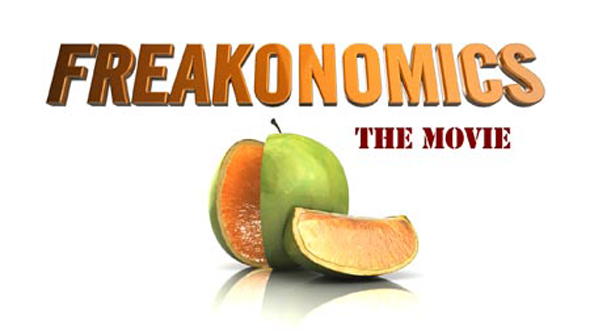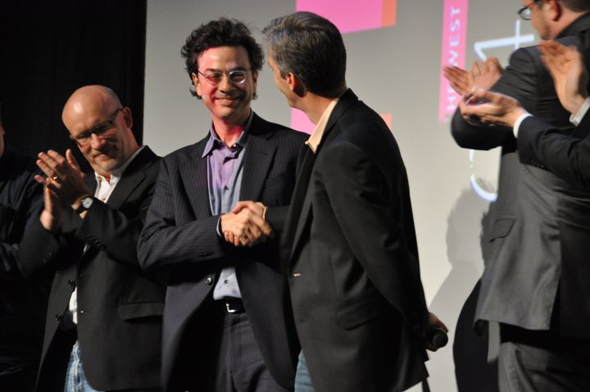Freakonomics, a documentary based on the best-selling nonfiction book by Steven Levitt and Stephen Dubner, proved to be a great close to the 2010 Tribeca Film Festival. Similar to book’s collective article approach, the film is divided into a number of segments, directed by an all-star team of non-fiction storytellers, each bringing their own style to the mix.
Focusing on the book’s concept that incentives matter, executive director Seth Gordon (King of Kong: A Fistful of Quarters) directs a number of short introductory segments (some of which, including one on real estate agent motives, are derived right from the source material) between each of the other filmmakers’ longer segments. Featuring economist Levitt and journalist Dubner, and imploring some playful animation, these segments provide a nice consistency throughout the film, while also establishing the two authors as interesting, personable characters.
Morgan Spurlock (Super Size Me) starts off the longer segments with his version of “Roshanda by any other name” named after the 6th chapter in the source material. Examining the economic impacts of “white” versus “black” names, Spurlock explores whether a person’s name can dictate success. Using humorous street interviews and reenactments, Spurlock infuses humor into his delivery, which service as a nice introduction and balance to a number of the later, more emotionally heavy segments.
Drawing his inspiration from the first chapter of the book, Alex Gibney (Tribeca 2010 festival films My Trip to Al-Qaeda and the Untitled Eliot Spitzer Film) explores the economics of cheating, with a source book driven focus on Chicago public school teachers who changed answers on their students’ standardized tests and Japanese sumo wrestlers who conspired to throw certain matches, both examples occurring when the stakes were high. This segment is very profound, using a variety of expressive imagery and testimonials. However, where this segment does fall short is its attempt to incorporate more recent events, including as the Bernie Madoff scandal, in its discussion of the illusion of purity. While I like the idea that Gibney would infuse his own interests into this exploration, the insertion of US financial debacles comes of a bit forced, and probably should have been left out.
Eugene Jarecki (Why We Fight) directs the most controversial and emotional segment of the film (an the book), titled “It’s Not Always a Wonderful Life.” This provocative section is based on Levitt’s theory the a dramatic drop in crime rates in the 1990s was partially due to the legalization of abortion. Interspersing his segment with clips from “It’s a Wonderful Life,” Jarecki handles this touchy subject matter with care and tact.
The final segment, directed by Heidi Ewing and Rachel Grady (Jesus Camp) continue the theme of incentives in exploring if a 9th grader can be bribed to succeed in school. This segment becomes involved with a current study Levitt and colleagues at the University of Chicago are conducting at an area high school, seeing if financial incentives will cause improved performance among academically under-performing students. While this section lacks the depth shown in the others, it feels in some ways excusable as it feels as though the team is still within the experiment and research stage.
Overall this film is visually satisfying, with interesting content delivered in stimulating ways by diverse voices. The film, recently acquired by Magnolia pictures, is set to be released theatrically this fall. Keep an eye out for it, as this is definitely a film worth watching.
8.5 out of 10
What do you think about this book-to-film adaption?



